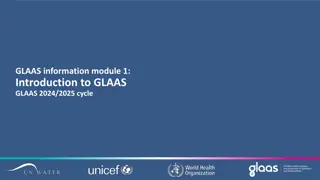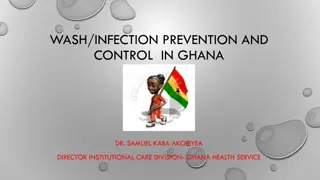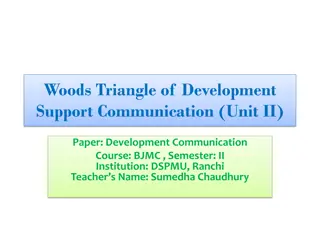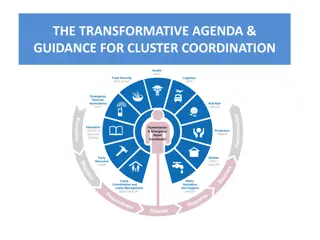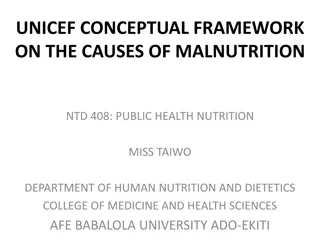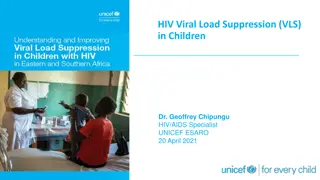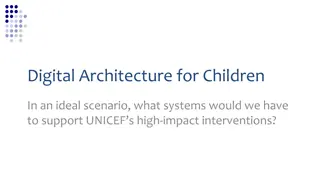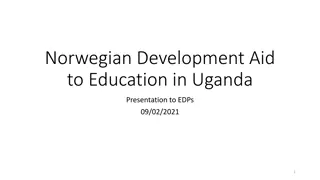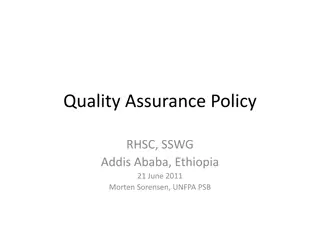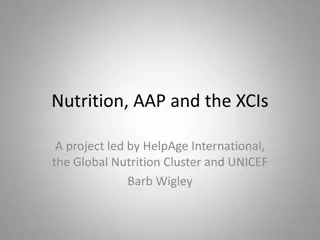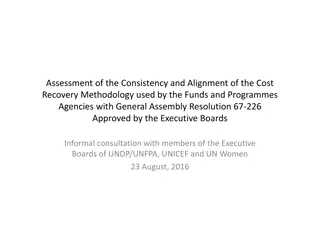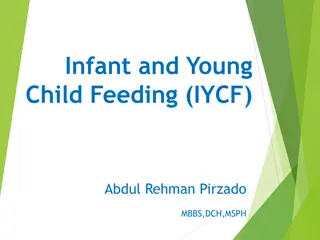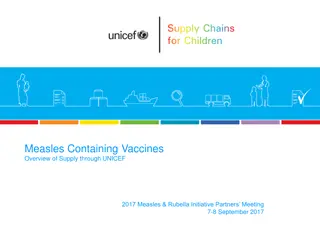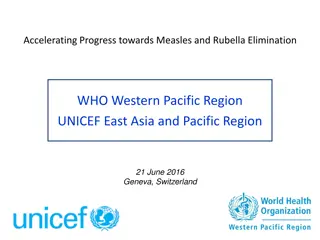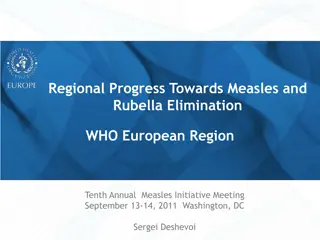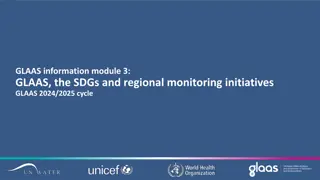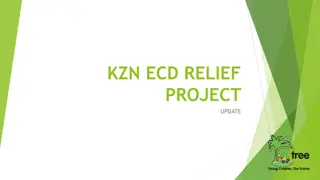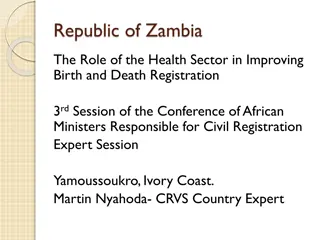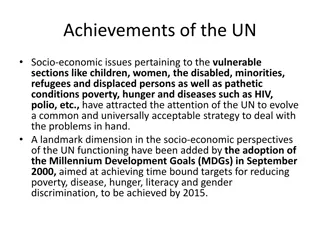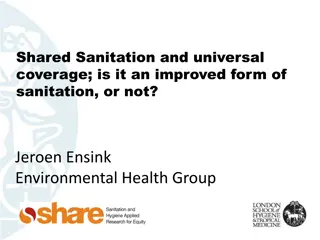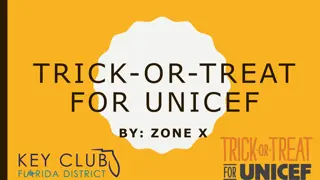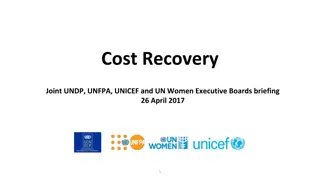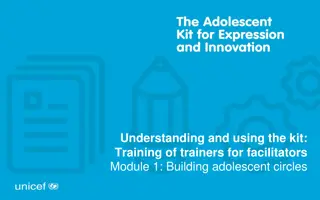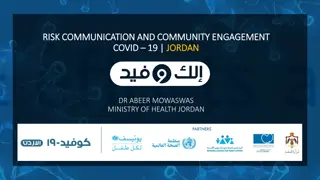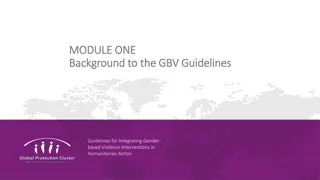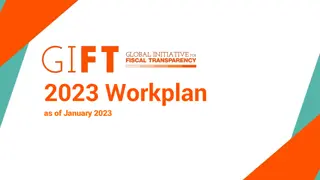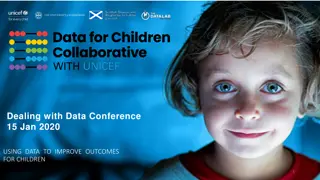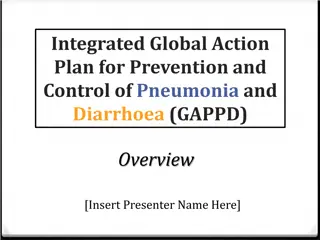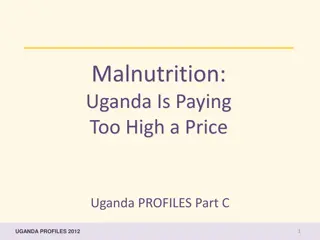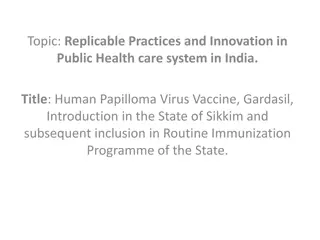Engaging Activities for Earth Day Awareness
Dive into a resource developed by UNICEF to explore Earth Day and environmental protection. Discover engaging slides, activities, and reflection prompts to inspire learning and action. Encourage discussions on sustainability, conservation, and the importance of protecting our planet. Get involved in
3 views • 12 slides
Overview of GLAAS: Global Assessment of Sanitation and Drinking Water
GLAAS, implemented by WHO and UNICEF on behalf of UN-Water, provides global updates on WASH systems. It focuses on monitoring, identifying progress drivers, and supporting country-led processes. The data collected helps in improving sector coordination, developing policies, and advocating for fundin
0 views • 11 slides
Empowering Rural India Towards ODF Plus by 2024: UNICEF and PriMove Initiative
Working in collaboration with UNICEF and PriMove, the initiative aims to make rural India Open Defecation Free Plus by 2024 through capacity building efforts and strengthening the delivery system. Key components include module development, training programs, handholding support, and a cascading mode
0 views • 14 slides
Alina Michalska - Nutrition Specialist with UNICEF ESARO
Alina Michalska is a Nutrition Specialist with UNICEF Eastern and Southern Africa Regional Office (ESARO) based in Nairobi. She has a strong background in nutrition information systems and has worked on various projects to improve nutrition outcomes in different regions. With a Master's degree from
3 views • 22 slides
Global Measles and Rubella Update - April 2024
The Global Measles and Rubella Report provides provisional data on the reported cases of measles and rubella, distributed monthly via email. Official numbers are available in July each year through the WHO/UNICEF annual data collection. The report is based on surveillance data from Member States, wi
7 views • 62 slides
Emergency Procedures
The presentation outlines UNICEF's emergency procedures focusing on strengthening WASH anticipatory action, preparedness, and response. It covers key definitions, classification of emergencies, and levels of response required based on the scale and complexity of the situation. The programmatic appro
2 views • 19 slides
Importance of Teaching Life Skills for Healthy Child Development
Life skills education plays a crucial role in promoting healthy child and adolescent development by enhancing adaptive behavior, problem-solving abilities, and social skills. It encompasses three core areas: thinking skills, social skills, and emotional skills. Teaching life skills is essential for
4 views • 15 slides
Enhancing Infection Prevention and Control in Ghana's Health Facilities
The Ghana Health Service, under the leadership of Dr. Samuel Kaba Akoriyea, has implemented initiatives to strengthen infection prevention and control (IPC) in healthcare facilities. This includes training programs for health staff, development of national technical guidelines, and establishment of
1 views • 4 slides
Enhancing Evaluation Capabilities in Mongolia for Agenda 2030
The Mongolian Evaluation Network in collaboration with UNDP is working to integrate the 2030 Agenda into national strategies and plans, establish institutional coordination mechanisms, align budgets, and enhance data monitoring systems. Key stakeholders including government agencies, NGOs, and inter
0 views • 9 slides
Understanding Woods Triangle of Development Support Communication
John L. Woods introduced the concept of Woods Triangle, emphasizing the interconnection between knowledge generators, political leaders, and development knowledge users. Development Support Communication, popularized by UNICEF and UNDP, plays a crucial role in linking various stakeholders involved i
6 views • 5 slides
Transformative Agenda and Guidance for Effective Cluster Coordination
Explore the transformative agenda and guidance for cluster coordination, emphasizing the roles of UNICEF as a cluster lead agency, core cluster functions, inter-cluster coordination, and management strategies for effective humanitarian response. Key focus areas include accountability, human financin
1 views • 19 slides
UNICEF Conceptual Framework on the Causes of Malnutrition
The UNICEF conceptual framework on the causes of malnutrition outlines the multidimensional factors contributing to malnutrition, categorized into immediate, underlying, and basic causes. Immediate causes include inadequate dietary intake and diseases, while underlying causes involve issues like ina
2 views • 18 slides
Addressing Viral Load Suppression in Children with HIV: Insights and Recommendations
This study led by Dr. Geoffrey Chipungu, an HIV/AIDS Specialist at UNICEF ESARO, explores the rates, trends, and factors associated with HIV viral load suppression (VLS) in children. The research reveals sub-optimal VLS rates in children compared to adults, highlighting the need for improved policie
5 views • 12 slides
Digital Architecture for Supporting UNICEF's High-Impact Interventions
In an ideal scenario, the digital architecture for children would encompass systems such as Enterprise Architecture, Functional Architecture, and Solution Architecture to support UNICEF's high-impact interventions. It would involve integrated platforms for Health Information Exchange, Supply Chain M
1 views • 19 slides
Norwegian Development Aid to Education in Uganda
Presentation highlights Norwegian development aid initiatives in Uganda's education sector, including projects, budgets, partnerships, and support through various programs and organizations like NORHED, NORPART, GIZ, Caritas, Norad, UNESCO, UNICEF, GPE, ECW, and HISP UiO for digitizing education dat
0 views • 5 slides
Quality Assurance Policy for Reproductive Health Supplies and Services in Ethiopia
This policy outlines the quality assurance measures implemented in Addis Ababa, Ethiopia, in June 2011. It emphasizes risk management in procurement, quality approval processes, and monitoring. The achievements include the assurance of contraceptives and essential medical devices, capacity building,
0 views • 7 slides
Enhancing Accountability and Program Quality in Global Nutrition Initiatives
The project led by HelpAge International, the Global Nutrition Cluster, and UNICEF focuses on enhancing accountability and program quality in global nutrition initiatives. It covers various commitments such as leadership/governance, transparency, feedback and complaints, participation, and more. Con
1 views • 12 slides
Assessment of Cost Recovery Methodology Alignment with General Assembly Resolution 67-226
This report assesses the consistency and alignment of the cost recovery methodology used by UNDP/UNFPA, UNICEF, and UN Women with General Assembly Resolution 67-226. Issues such as declining core funding, the need to avoid cross-subsidization, and the importance of full cost recovery are highlighted
0 views • 14 slides
Global Impact of Infant and Young Child Feeding (IYCF) Strategies
Global strategies like Infant and Young Child Feeding (IYCF) developed by WHO and UNICEF aim to address the high mortality rates among children under 5 due to malnutrition. The strategies emphasize the importance of appropriate feeding practices during pregnancy, lactation, and early childhood to co
0 views • 14 slides
Overview of Measles-Containing Vaccines Supply and Demand through UNICEF
The supply and demand dynamics of measles-containing vaccines (MCV) procured through UNICEF are explored, highlighting the total value of vaccines procured, the impact on humanitarian situations, and the challenges faced in forecasting and production. UNICEF works with multiple manufacturers for MCV
0 views • 7 slides
Progress Towards Measles and Rubella Elimination in the Western Pacific Region
WHO and UNICEF have set ambitious goals for eliminating measles and rubella, emphasizing the importance of routine immunization. Progress is tracked through reported cases, vaccine coverage, and supplementary immunization activities (SIAs) in various countries of the Western Pacific Region from 2000
0 views • 20 slides
Progress Towards Measles and Rubella Elimination in WHO European Region
The WHO European Region has been making significant progress towards eliminating measles and rubella, with 96% reduction in measles and 97% reduction in rubella from 1990 to 2011. Strategies include ensuring high vaccination coverage and conducting supplemental immunization activities in susceptible
0 views • 24 slides
Sustainable Development Goal 6: Monitoring Progress Towards Clean Water and Sanitation
The content discusses the monitoring initiatives and global indicators related to Sustainable Development Goal 6, focusing on clean water and sanitation. It delves into the roles of various organizations like UN-Water, GLAAS, and WHO/UNICEF in monitoring targets and indicators. Additionally, it high
0 views • 16 slides
KZN ECD Relief Project Update Activities and Challenges Summary
Activities for the KZN ECD Relief Project include translating booklets, designing materials, providing support to RTOs, and assisting partners like NECT and UNICEF. Challenges faced include shortages of materials and blurred reporting lines, affecting the training schedule for practitioners. The pro
0 views • 6 slides
The Role of the Health Sector in Birth and Death Registration in Zambia
The health sector plays a crucial role in improving birth and death registration in Zambia, as a significant percentage of these events occur in health facilities. This provides an opportunity for immediate registration at the point of occurrence, contributing to better vital event recording. Despit
0 views • 10 slides
UN's Impact on Socio-Economic Development and Rights of Vulnerable Groups
The UN has made significant strides in addressing socio-economic issues affecting vulnerable groups such as children, women, the disabled, minorities, refugees, and displaced persons. Through initiatives like the Millennium Development Goals, the UN aims to combat poverty, hunger, diseases, and prom
0 views • 10 slides
Debate on Shared Sanitation: Improved or Not?
The discussion revolves around the classification of shared sanitation as improved or unimproved. WHO and UNICEF have a classification system where shared sanitation is considered unimproved due to concerns about cleanliness and accessibility. A proposed policy change by JMP seeks to include shared
0 views • 22 slides
Join Trick-or-Treat for UNICEF to Eliminate Maternal and Neonatal Tetanus
Key Club and UNICEF are collaborating through Trick-or-Treat for UNICEF to help eradicate Maternal and Neonatal Tetanus (MNT). This initiative has raised over $175 million since 1950. Maternal/Neonatal Tetanus affects millions globally due to unsanitary birthing conditions. Learn how to get involved
0 views • 5 slides
Joint UNDP, UNFPA, UNICEF, UN Women Executive Boards Cost Recovery Briefing
Briefing on cost recovery for the joint Executive Boards of UNDP, UNFPA, UNICEF, and UN Women, covering topics such as feedback on cost recovery, role of core resources, cost recovery models using a LEGO approach, harmonization efforts, guidance for Executive Boards, and next steps towards proposing
0 views • 42 slides
Supporting Adolescents in Emergencies: UNICEF's Kit for Expression and Innovation
UNICEF's Adolescent Kit for Expression and Innovation provides a comprehensive package of resources to support adolescents (ages 10-18) during and post emergencies. It integrates psychosocial support, life skills, adolescent participation, and peacebuilding principles. The kit includes guidance for
0 views • 27 slides
Risk Communication and Community Engagement in Jordan's COVID-19 Response
Risk Communication and Community Engagement (RCCE) efforts in Jordan prioritize collaboration to disseminate accurate information, counter misinformation, and promote behavior change. Partners include the Ministry of Health, UNICEF, WHO, and others, reaching millions with key messages and interventi
0 views • 15 slides
Enhancing Gender-based Violence Interventions in Humanitarian Action
The guidelines focus on integrating gender-based violence interventions into humanitarian action, emphasizing key changes and additions such as structural modifications, contextual considerations, and enhanced accountability. Led by UNICEF and UNFPA, the revision process involved extensive consultat
0 views • 21 slides
Fiscal Transparency and Public Participation Initiatives in 2023
The 2023 workplan involves various initiatives focused on advancing transparency and public participation in fiscal policies. It includes capacity building, global norms harmonization, public participation mechanisms, innovative approaches for inclusive budgets, and partnership projects with organiz
0 views • 11 slides
Data for Children Collaborative with UNICEF: Opportunities and Challenges
The Data for Children Collaborative with UNICEF aims to enhance outcomes for children by leveraging data and data science. This unique partnership between UNICEF, the University of Edinburgh, and the Scottish Government tackles childhood issues at local, national, and global levels. Through innovati
0 views • 13 slides
Global Action Plan for Prevention of Pneumonia and Diarrhoea
The Integrated Global Action Plan for Prevention and Control of Pneumonia and Diarrhoea (GAPPD) aims to address the significant impact of these diseases on children under five globally. Released by WHO and UNICEF, the plan focuses on protecting children, preventing diseases, and treating illnesses t
0 views • 17 slides
Addressing Malnutrition in Uganda: A Call to Action
Uganda is grappling with the high cost of malnutrition, leading to adverse impacts on health, productivity, and economic development. This collection of presentations emphasizes the urgent need for intervention to prevent further suffering and loss of life. The content highlights the benefits of add
0 views • 7 slides
Introduction of Gardasil HPV Vaccine in Sikkim's Routine Immunization Programme
Cervical cancer is a major health issue in Sikkim, India, prompting the introduction of the Gardasil HPV vaccine to address the high prevalence of HPV infections leading to cervical cancer. The state-wide immunization campaign targeted girls aged 9-14, aiming to incorporate the vaccine into the rout
0 views • 10 slides

